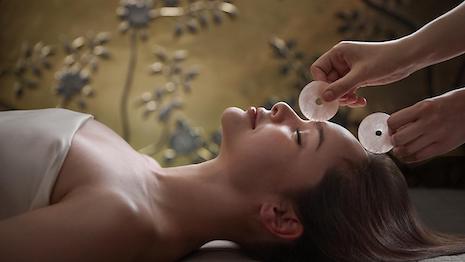- About
- Subscribe Now
- New York,
May 2, 2019

 Spa treatments are still a popular aspect of wellness travel. Image credit: Mandarin Oriental
Spa treatments are still a popular aspect of wellness travel. Image credit: Mandarin Oriental
More than 80 percent of affluents are interested in wellness travel, as global demand grows for experiences that emphasize physical and mental wellbeing.
According to a new report from Altiant, less than 70 percent of high-net-worth individuals feel relaxed despite high levels of happiness and wealth. Chinese affluents report the lowest levels of happiness while being the most likely to prefer relaxing trips rather than active vacations.
“Anxiety, stress and mental health are growing concerns for all, with a particular emphasis on healthy lifestyles and self-reflection,” said Meryam Schneider, vice president of marketing and partnerships at Altiant, Paris. “Younger segments seem to be driving the wellbeing trends upwards.
“We also see many luxury hospitality brands integrating wellness activities as a differentiation feature,” she said. “These elements are contributing to making luxury wellness travel the fastest growing segment in the industry.”
Altiant’s report is based on interviews with more than 600 individuals from the United Kingdom, United States, China and France who are among their respective country’s top 5 percent of income earners.
HNW wellness travelers
Forty-two percent of affluents have taken a planned wellness vacation and plan to do so again, including half of all Chinese respondents. Less than a third of U.K. respondents have previously gone on wellness trips, the fewest among countries surveyed.
Another 40 percent of HNWIs surveyed showed interest in taking their first wellness-oriented holidays, pointing to enormous opportunity for luxury hospitality brands to incorporate more mindful amenities and activities into their offerings.
Wellness is already part of most affluents’ daily routines. Image credit: Four Seasons
Two-thirds of respondents already incorporate wellness activities – such as healthy eating, exercise and mediation – into their daily routines.
One in four affluents prefer wellness services and activities to be located as part of the hotels or resorts at which they stay.
Among wellness activities, the majority of HNW travelers show interest in spa and massage treatments. Meanwhile, 54 percent of respondents are interested in exercise classes or activities such as kayaking and golfing.
One-third of respondents are also interested in wellness activities centered around mental health, such as silent retreats.
Thirty-five percent of affluent travelers would go on “detox” trips, which are most likely to be favored by French or Chinese consumers.
Nearly three-quarters of wellness travelers are open to receiving follow-up correspondence, such as coaching or advice, from trip organizers. This is another opportunity for hospitality groups to build consumer relationships and possibly create another revenue stream.
More than half of wellness travelers are interested in physical activities. Image credit: Ritz-Carlton
More than a quarter of wellness travelers would be willing to spend at least $3,750 on accommodations and wellness activities over a period of three nights.
Chinese and American affluents are the most likely to spend heavily on wellness travel, including 9 percent of Chinese respondents who would spend at least $6,250 for their trip.
Wellness opportunities
With affluent travelers’ interest in health and wellness becoming an important feature in selecting their next trip, high-end hospitality brands have been forced to embrace it.
While in the past brands and consumers were more focused on fitness, now digital detoxes and mental health are becoming more popular in catering to today’s overly connected affluent. Mandarin Oriental is one of many hospitality brands that offer interactive methods of detaching oneself from digital devices, including coaches and hands-on activities (see story).
As the wellness industry continues to disrupt the hospitality business, luxury fitness company Equinox is debuting its own hotel brand.
It is the goal of Equinox to provide guests with a “360-degree lifestyle travel experience” at its hotels. In addition to private and group fitness classes, amenities include a 25-yard indoor salt water pool, an outdoor leisure pool and hot and cold plunge pools (see story).
“There are clear opportunities to provide wellness holidays which also deliver luxurious and exclusive experiences,” Altiant’s Ms. Schneider said. “Wellness travel possesses a great aura, and the wellness traveler can become reliable brand ambassador.”
Share your thoughts. Click here